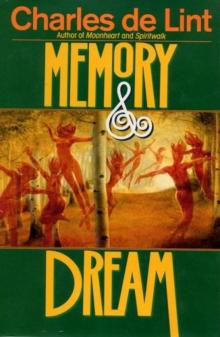- Home
- Charles de Lint
The Ivory and the Horn Page 6
The Ivory and the Horn Read online
Page 6
“You’re taking this too personally,” Stone said.
“It’s always personal.”
Stone put his arm around Dennison’s shoulders and steered him toward the door.
“It gets worse every time something like this happens,” Dennison went on. “For every one I help, I lose a dozen. It’s like pissing in the wind.”
“I know,” Stone said heavily.
The bright daylight stung Dennison’s eyes when he stepped outside. He hadn’t had breakfast yet, but he had no appetite. His pager beeped, but he didn’t bother to check the number he was supposed to call. He just shut off the annoying sound. He couldn’t deal with whatever the call was about. Not today. He couldn’t face going into the office either, couldn’t face all those hopeless faces of people he wanted to help; there just wasn’t enough time in a day, enough money in the budget, enough of anything to make a real difference.
Ronnie Egan’s lifeless features floated up in his mind.
He shook his head and started to walk. Aimlessly, but at a fast pace. Shoe leather on pavement now, but he couldn’t hear it for the sound of the traffic, vehicular and pedestrian. Half an hour after leaving the morgue he found himself on the waterfront, staring out over the lake.
He didn’t think he could take it anymore. He’d put in seven years as a caseworker for Social Services, but it seemed as though he’d finally burned out. Ronnie Egan’s stupid, senseless death was just too much to bear. If he went into the office right now, it would only be to type up a letter of resignation. He decided to get drunk instead.
Turning, he almost bumped into the attractive woman who was approaching him. She might be younger, but he put her at his own twenty-nine; she just wore the years better. A soft fall of light-brown hair spilled down to her shoulders in untidy tangles. Her eyes were a little too large for the rest of her features, but they were such an astonishing grey-green that it didn’t matter. She was wearing jeans and a “Save the Rainforests” T-shirt, a black cotton jacket overtop.
“Hi there,” she said.
She offered him a pamphlet that he reached for automatically, before he realized what he was doing. He dropped his hand and stuck it in his pocket, leaving her with the pamphlet still proffered.
“I don’t think so,” he said.
“It’s a serious issue,” she began.
“I’ve got my own problems.”
She tapped the pamphlet. “This is everybody’s problem.”
Dennison sighed. “Look, lady,” he said. “I’m more interested in helping people than trees. Sorry.”
“But without the rainforests—”
“Trees don’t have feelings,” he said, cutting her off. “Trees don’t cry. Kids do.”
“Maybe you just can’t hear them.”
Her gaze held his. He turned away, unable to face her disappointed look. But what was he supposed to do? If he couldn’t even be there for Ronnie Egan when the kid had needed help the most, what the hell did she expect him to do about a bunch of trees? There were other people, far better equipped, to deal with that kind of problem.
“You caught me on a bad day,” he said. “Sorry.”
He walked away before she could reply.
Dennison wasn’t much of a drinker. A beer after work a couple of times a week. Wine with a meal even more occasionally. A few brews with the guys after one of their weekend softball games—that was just saying his pager left him alone long enough to get through all the innings. His clients’ needs didn’t fit into a tidy nine-to-five schedule, with weekends off. Crises could arise at any time of the day or night— usually when it was most inconvenient. But Dennison had never really minded. He’d bitch and complain about it like everybody else he worked with, but he’d always be there for whoever needed the help.
Why hadn’t Sandy Egan call him last night? He’d told her to phone him, instead of just putting Ronnie outside again. He’d promised her, no questions. He wouldn’t use the incident as pressure to take the boy away from her. Ronnie was the first priority, plain and simple.
But she hadn’t called. She hadn’t trusted him, hadn’t wanted to chance losing the extra money Social Services gave her to raise the boy. And now he was dead.
Halfway through his fourth beer, Dennison started ordering shots of whiskey on the side. By the time the dinner hour rolled around, he was too drunk to know where he was anymore. He’d started out in a run-down bar somewhere on Palm Street; he could be anywhere now.
The smoky interior of the bar looked like every other place he’d been in this afternoon. Dirty wooden floors, their polish scratched and worn beyond all redemption. Tables in little better condition, chairs with loose legs that wobbled when you sat on them, leaving you unsure if it was all the booze you’d been putting away that made your seat feel so precarious, or the rickety furniture that the owner was too cheap to replace until it actually fell apart under someone. A TV set up in a corner of the bar where game shows and soap operas took turns until they finally gave way to the six o’clock news.
And then there was the clientele.
The thin afternoon crowd was invariably composed of far too many lost and hopeless faces. He recognized them from his job. Today, as he staggered away from the urinal to blink at the reflection looking back at him from the mirror, he realized that he looked about the same. He couldn’t tell himself apart from them if he tried, except that maybe they could hold their drink better.
Because he felt sick. Unable to face the squalor of one of the cubicles, he stumbled out of the bar, hoping to clear his head. The street didn’t look familiar, and the air didn’t help. It was filled with exhaust fumes and the tail end of rush-hour noise. His stomach roiled and he made his slow way along the pavement in front of the bar, one hand on the wall to keep his balance.
When he reached the alleyway, it was all he could do to take a few floundering steps inside before he fell to his hands and knees and threw up. Vomiting brought no relief. He still felt the world doing a slow spin and the stink just made his nausea worse.
Pushing himself away from the noxious puddle, the most he could manage was to fall back against the brick wall on this side of the alley. He brought his knees slowly up, wrapped his arms around them and leaned his head on top. He must have inadvertently turned his pager back on at some point in the afternoon, because it suddenly went off, its insistent beep piercing his aching head.
He undipped it from his belt and threw it against the far wall. The sound of it smashing was only slightly more satisfying than the blessed relief from its shrill beeping.
“You don’t look so good.”
He lifted his head at the familiar voice, half-expecting that one of his clients had found him in this condition, or worse, one of his coworkers. Instead he met the grey-green gaze of the woman he’d briefly rim into by the lakefront earlier in the day.
“Jesus,” he said. “You… you’re like a bad penny.”
He lowered his head back onto his knees again and just hoped she’d go away. He could feel her standing there, looking down at him for a long time before she finally went down on one knee beside him and gave his arm a tug.
“C’mon,” she said. “You can’t stay here.”
“Lemme alone.”
“I don’t just care about trees, either,” she said.
“Who gives a fuck.”
But it was easier to let her drag him to his feet than to fight her offer of help. She slung his arm over her shoulder and walked him back to the street where she flagged down a cab. He heard her give his address to the cabbie and wondered how she knew it, but soon gave up that train of thought as he concentrated on not getting sick in the back of the cab.
He retained the rest of the night in brief flashes. At some point they were in the stairwell of his building, what felt like a month later he was propped up beside the door to his apartment while she worked the key in the lock. Then he was lying on his bed while she removed his shoes.
“Who… who are you?” he r
emembered asking her.
“Debra Eisenstadt.”
The name meant nothing to him. The bed seemed to move under him. I don’t have a water bed, he remembered thinking, and then he threw up again. Debra caught it in his wastepaper basket.
A little later still, he came to again to find her sitting in one of his kitchen chairs that she’d brought into the bedroom and placed by the head of the bed. He remembered thinking that this was an awful lot to go through just for a donation to some rainforest fund.
He started to sit up, but the room spun dangerously, so he just let his head fall back against the pillow. She wiped his brow with a cool, damp washcloth.
“What do you want from me?” he managed to ask.
“I just wanted to see what you were like when you were my age,” she said.
That made so little sense that he passed out again trying to work it out.
She was still there when he woke up the next morning. If anything, he thought he actually felt worse than he had the night before. Debra came into the room when he stirred and gave him a glass of Eno that helped settle his stomach. A couple of Tylenol started to work on the pounding behind his eyes.
“Someone from your office called and I told her you were sick,” she said. “I hope that was okay.”
“You stayed all night?”
She nodded, but Dennison didn’t think she had the look of someone who’d been up all night. She had a fresh-scrubbed glow to her complexion and her head seemed to catch the sun, spinning it off into strands of light that mingled with the natural highlights already present in her light-brown hair. Her hair looked damp.
“I used your shower,” she said. “I hope you don’t mind.”
“No, no. Help yourself.”
He started to get up, but she put a palm against his chest to keep him lying down.
“Give the pills a chance to work,” she said. “Meanwhile, I’ll get you some coffee. Do you feel up to some breakfast?”
The very thought of eating made his stomach churn.
“Never mind,” she said, taking in the look on his face. “I’ll just bring the coffee.”
Dennison watched her leave, then straightened his head and stared at . the ceiling. After meeting her, he thought maybe he believed in angels for the first time since Sunday school.
It was past ten before he finally dragged himself out of bed and into the shower. The sting of hot water helped to clear his head; being clean and putting on fresh clothes helped some more. He regarded himself in the bathroom mirror. His features were still puffy from alcohol poisoning and his cheeks looked dirty with twenty-four hours worth of dark stubble. His hands were unsteady, but he shaved all the same. Neither mouthwash nor brushing his teeth could quite get rid of the sour taste in his mouth.
Debra had toast and more coffee waiting for him in the kitchen.
“I don’t get it,” he said as he slid into a chair across the table from her. “I could be anyone-^-some maniac for all you know. Why’re you being so nice to me?”
She just shrugged.
“C’mon. It’s not like I could have been a pretty sight when you found me in the alley, so it can’t be that you were attracted to me.”
“Were you serious about what you said last night?” she asked by way of response. “About quitting your job?”
Dennison paused before answering to consider what she’d asked. He couldn’t remember telling her that, but then there was a lot about yesterday he couldn’t remember. The day was mostly a blur except for one thing. Ronnie Egan’s features swam up in his mind until he squeezed his eyes shut and forced the image away.
Serious about quitting his job?
“Yeah,” he said with a slow nod. “I guess I was. I mean, I am. I don’t think I can even face going into the office. I’ll just send them my letter of resignation and have somebody pick up my stuff from my desk.”
“You do make a difference,” she said. “It might not seem so at a time like this, but you’ve got to concentrate on all the people you have helped. That’s got to count for something, doesn’t it?”
“How would you know?” Dennison asked her. No sooner did the question leave his mouth, than it was followed by a flood of others. “Where did you come from? What are you doing here? It’s got to be more than trying to convince me to keep my job so that I can afford to donate some money to your cause.”
“You don’t believe in good Samaritans?”
Dennison shook his head. “Nor Santa Claus.”
But maybe angels, he added to himself. She was so fresh and pretty—light years different from the people who came into his office, their worn and desperate features eventually all bleeding one into the other.
“I appreciate your looking after me the way you did,” he said. “Really I do. And I don’t mean to sound ungrateful. But it just doesn’t make a lot of sense.”
“You help people all the time.”
“That’s my job—was my job.” He looked away from her steady gaze. “Christ, I don’t know anymore.”
“And that’s all it was?” she asked.
“No. It’s just… I’m tired, I guess. Tired of seeing it all turn to shit on me. This little kid who died yesterday… I could’ve tried harder. If I’d tried harder, maybe he’d still be alive.”
“That’s the way I feel about the environment, sometimes,” she said. “There are times when it just feels so hopeless, I can’t go on.”
“So why do you?”
“Because the bottom line is I believe I can make a difference. Not a big one. What I do is just a small ripple, but I know it helps. And if enough little people like me make our little differences, one day we’re going to wake up to find that we really did manage to change the world.”
“There’s a big distinction between some trees getting cut down and a kid dying,” Dennison said.
“From our perspective, sure,” she agreed. “But maybe not from a global view. We have to remember that everything’s connected. The real world’s not something that can be divided into convenient little compartments, like we’ll label this, ‘the child abuse problem,’ this’ll go under ‘depletion of the ozone layer.’ If you help some homeless child on these city streets, it has repercussions that touch every part of the world.”
“I don’t get it.”
“It’s like a vibe,” she said. “If enough people think positively, take positive action, then it snowballs all of its own accord and the world can’t help but get a little better.”
Dennison couldn’t stop from voicing the cynical retort that immediately came into his mind.
“How retro,” he said.
“What do you mean?”
“It sounds so sixties. All this talk about vibes and positive mumbo-jumbo.”
“Positive thinking brought down the Berlin Wall,” she said.
“Yeah, and I’m sure some fortune teller predicted it in the pages of a supermarket tabloid, although she probably got the decade wrong. Look, I’m sorry, but I don’t buy it. If the world really worked on ‘vibes,’ I think it’d be in even worse shape than it already is.”
“Maybe that’s what is wrong with it: too much negative energy. So we’ve got to counteract it with positive energy.”
“Oh, please.”
She got a sad look on her face. “I believe it,” she said. “I learned that from a man that I came to love very much. I didn’t believe him when he told me, either, but now I know it’s true.”
“How can you know it’s true?”
Debra sighed. She put her hand in the back pocket of her jeans and pulled out a piece of paper.
“Talk to these people,” she said. “They can explain it a whole lot better than I can.”
Dennison looked at the scrap of paper she’d handed him. “Elders’ Council” was written in ballpoint. The address given was City Hall’s.
“Who are they?”
“Elders from the Kickaha Reservation.”
“They’ve got an office at City Hall?�
��
Debra nodded. “It’s part’ of a program to integrate alternative methods of dealing with problems with the ones we would traditionally use.”
“What? People go to these old guys and ask them for advice?”
“They’re not just men,” she said. “In fact, among the Kickaha—as with many native peoples—there ate more women than men sitting on an elders’ council. They’re the grandmothers of the tribe who hold and remember all the wisdoms. The Kickaha call them ‘the Aunts.’ “
Dennison started to shake his head. “I know you mean well, Debra, but—”
“Just go talk to them—please? Before you make your decision.”
“But nothing they say is going to—”
“Promise me you will. You asked me why I helped you last night, well, let’s say this is what I want in return: for you just to talk to them.”
The last thing Dennison wanted was to involve himself with some nut-case situation like this, but he liked the woman, despite her flaky beliefs, and he did owe her something. He remembered throwing up last night and her catching the vomit in his garbage can. How many people would do that for a stranger?
“Okay,” he said. “I promise.”
The smile that she gave him seemed to make her whole face glow.
“Good,” she said. “Make sure you bring a present. A package of tobacco would be good.”
“Tobacco.”
She nodded. “I’ve got to go now,” she added. She stood up and shook his hand. “I’m really glad I got the chance to meet you.”
“Wait a minute,” Dennison said as she left the kitchen.
He followed her into the living room where she was putting on her jacket.
“Am I going to see you again?” he asked.
“I hope so.”
“What’s your number?”
“Do you have a pen?”
He went back into the kitchen and returned with a pencil and the scrap of paper she’d given him. She took it from him and quickly scribbled a phone number and address on it. She handed it back to him, gave him a quick kiss on the cheek, and then she was out the door and gone.

 Widdershins
Widdershins The Ivory and the Horn
The Ivory and the Horn Yarrow
Yarrow The Blue Girl
The Blue Girl Spirits in the Wires
Spirits in the Wires The Painted Boy
The Painted Boy The Little Country
The Little Country Jack of Kinrowan: Jack the Giant-Killer / Drink Down the Moon
Jack of Kinrowan: Jack the Giant-Killer / Drink Down the Moon Moonheart
Moonheart Dreams Underfoot
Dreams Underfoot Into the Green
Into the Green Trader
Trader Spiritwalk
Spiritwalk Someplace to Be Flying
Someplace to Be Flying Jack in the Green
Jack in the Green The Valley of Thunder
The Valley of Thunder Out of This World
Out of This World The Cats of Tanglewood Forest
The Cats of Tanglewood Forest Seven Wild Sisters
Seven Wild Sisters Memory and Dream
Memory and Dream The Very Best of Charles De Lint
The Very Best of Charles De Lint Under My Skin
Under My Skin Forests of the Heart
Forests of the Heart The Newford Stories
The Newford Stories Moonlight and Vines
Moonlight and Vines Angel of Darkness
Angel of Darkness The Onion Girl
The Onion Girl Greenmantle
Greenmantle Waifs And Strays
Waifs And Strays From a Whisper to a Scream
From a Whisper to a Scream Over My Head
Over My Head The Ivory and the Horn n-6
The Ivory and the Horn n-6 Our Lady of the Harbour
Our Lady of the Harbour Dreams Underfoot n-1
Dreams Underfoot n-1 Jack the Giant-Killer (Jack of Kinrowan Book 1)
Jack the Giant-Killer (Jack of Kinrowan Book 1) Memory and Dream n-5
Memory and Dream n-5 Under My Skin (Wildlings)
Under My Skin (Wildlings) Newford Stories
Newford Stories The Wind in His Heart
The Wind in His Heart Ivory and the Horn
Ivory and the Horn